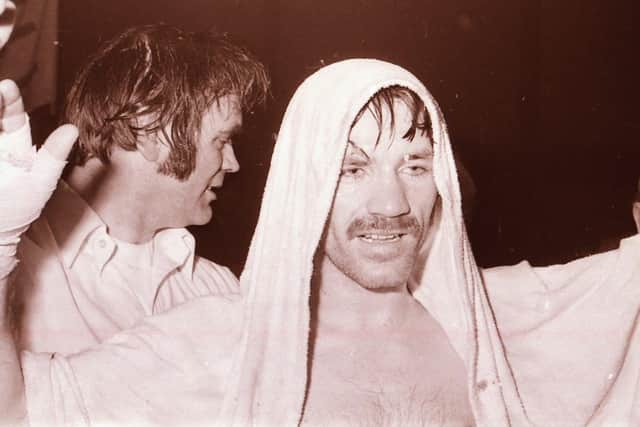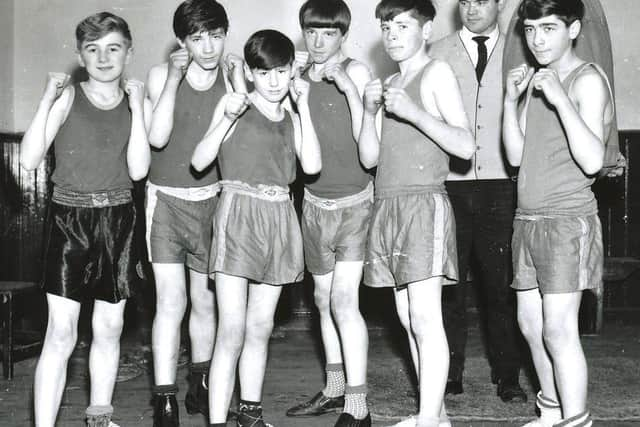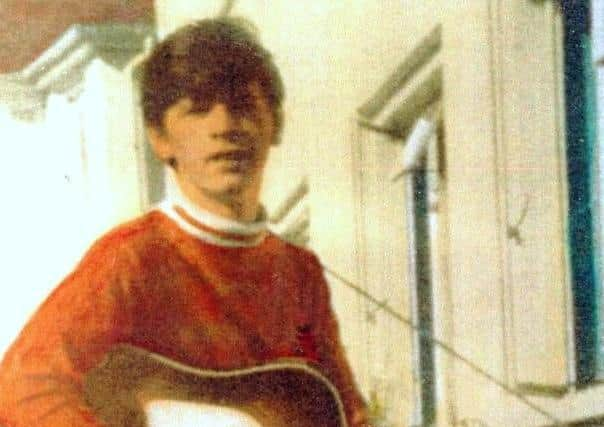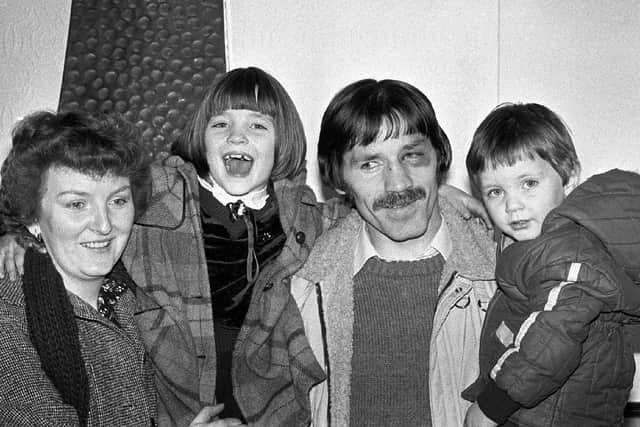Charlie Nash on his battle with depression, Bloody Sunday and how boxing saved his life
and live on Freeview channel 276
The former British and two-time EBU European lightweight champion faced the biggest fight of his life after the British Army shot dead his younger brother, William, in the Bogside as he ran for cover, and wounded his father, Alex, on one of the darkest days of the Troubles on January 30, 1972.
Charlie has battled episodes of depression ever since and, in an frank and honest interview reflecting back on a boxing career which began 50 years ago with an Ulster Senior title victory in the Ulster Hall, Charlie explains how he ‘came to within a breath’ of joining the IRA after identifying the body of his 19 year-old brother, shot in the back by the Parachute Regiment during a civil rights march on the battle-torn streets of Derry.
Advertisement
Hide AdAdvertisement
Hide AdInstead, the Creggan man chose a different path. He returned to the gym two weeks after the loss of his brother and, the following summer, went on to represent Ireland in the quarter-finals of the biggest amateur boxing competition in the world.
“Had there been no Olympic Games that year, I would’ve probably ended up in the IRA,” admits Charlie candidly. “There were actually people in my house that day and, to be honest, I was a breath away from doing that.
“Boxing saved my life. I had to make up my mind. Was I going to go that way or this way? I took the decision that I would continue to train as a boxer. I was back in the club a couple of weeks after the funerals of Bloody Sunday. That’s what saved my life, and I was away to Munich in July.”
The sweet science and the commitment and discipline required to make it in the sport gave Charlie a release and a means of absorbing his grief. And, with the Olympics in Germany that summer, he had a focus which refused to allow the Troubles to take another promising life. He held on to his boxing dream and went on to become a sporting icon for the city and beyond.
Advertisement
Hide AdAdvertisement
Hide AdCharlie was one of 12 children but describes William as his ‘best friend’. The two brothers, born just a year apart, shared a love of boxing and Charlie says William was handy with his fists and a regular at St Mary’s gym in Creggan.


“Willie was a year below me in the family,” he explains. “There were seven boys and five girls. We had a big family. I was born in May ‘51 and Willie was born a year later so we were the best of friends.
“Willie did a bit of boxing as well. He had more of an aggressive style than me. He trained in the boxing club with me before he actually got to the stage he packed in boxing, He was a good boxer and very healthy as well.”
Two weeks before Bloody Sunday, Charlie was in Dublin defending his Irish Senior lightweight title. On the day before that fateful Sunday afternoon, he returned to the Irish capital following his brother ‘Banty’s’ wedding, to support another fighter from the St Mary’s club, Damian McDermott, who was competing at the Irish Junior Finals.
Advertisement
Hide AdAdvertisement
Hide AdAlongside his trainer, Tommy Donnelly, they made their way back to Derry on the Sunday evening by car only to be met by a large gathering at his home in Dunree Gardens and the heartbreaking news of his brother’s death.


With his mother, who had suffered a heart attack two weeks’ previously, still in hospital and unaware of the tragedy which had unfolded, or even that her husband was in the same building but on a different floor with gunshot injuries to his hand and body, Charlie was left with the task of confirming the death of his brother. It was a life-changing event which never leaves him.
“I didn’t get back up the road until the Sunday night. By that time the march was over and all those people were dead. There was a crowd gathered outside my house and inside my house when I got back and I went in asking, ‘What’s the matter? What’s the matter?’
“They told me, ‘your father was shot and your brother was shot’. “One of my friends lived across the street and he took me over to the hospital in his car. There were policemen all about the place and I told them I was over because my father and brother were shot.
Advertisement
Hide AdAdvertisement
Hide AdThey said they would take me to the morgue. When I went in, there were policemen around the morgue blocking it. One of them took me in and I just saw the bodies laying with white sheets over them. The police man lifted up four or five sheets and Willie was one of them lying there. He was wearing his new suit,” recalls Charlie. “He had got a new suit for Banty’s wedding. It was a nightmare.


“My mammy actually had a heart attack or heart failure a couple of weeks before that so I went up to the ward she was in. She didn’t know my da was shot. He was in hospital as well on a different ward. She didn’t know about Willie but we couldn’t tell her because she was in a bad way. She didn’t know until three or four days later. My da was out of hospital but she was still in. That has never left me.”
Charlie suffered many blows during his boxing career but none so hard as that Sunday evening. And, yet, from those depths, the determined Creggan man achieved an ultimate high when he represented the city at the Olympics just six months later - the pinnacle of amateur boxing.
“After Bloody Sunday, I actually couldn’t wait to get back to the club. I was picked to go to the Olympic Games in Munich that July. I had to just keep on training if I wanted to go to the Olympics. It was a long time since anyone from Derry had been to the Olympics so I didn’t want to miss it and it actually probably saved my life.”
Advertisement
Hide AdAdvertisement
Hide AdWhile his brother’s death may have been the trigger for his ongoing battle with depression, Charlie believes it was only after he hung up his gloves that he began to experience symptoms.
When the lights went out on the packed arenas and the media scrums dispersed, Charlie needed the direction and often stern words from his beloved wife, Betty, to keep him on the straight and narrow.
“She’s been my backbone,” he said. “Without Betty I wouldn’t have achieved what I did as a boxer. I met her when I was almost 19 and she was just over 17. We have a great relationship.


We got married and had a family together. We have four children, two boys and two girls and she’s still keeping me right with everything.
Advertisement
Hide AdAdvertisement
Hide Ad“Without her support and knowledge, I wouldn’t have gone anywhere. Without her, I don’t know what way I would’ve ended up,” he reflects.
“When I’m down, she’ll drag me out of bed. She’ll say, ‘Come on, get out of bed, there’s housework to do’. ‘Get that hoovering done’,” he laughs. “She lets me away with nothing, She’ll tell me to take a walk to the shop and bring her up something. She’s always making me do things to keep me occupied. If I wanted to lie down, she would make me go out for a walk and tell me I had to do something. She’s the rock of my life. Without her, God knows what would’ve happened to me.”
And his role as a boxing coach at St Mary’s ABC, working with the city’s aspiring young pugilists, has helped him keep his mental health in check and ensures that an invisible illness like depression rarely rears its ugly head.
At his lowest ebb, Charlie would keep a diary, 40 pages of anecdotes and recollections written in pencil, in which he’s documented his glorious successes, the five national titles, Olympic Games and European Championships as an amateur and, of course, those unforgettable moments as a professional from the Guildhall and Templemore Sports Complex in Derry to Dalymount Park, Kelvin Hall, Glasgow, and the Brondby Hallen in Copenhagen, Denmark.
Advertisement
Hide AdAdvertisement
Hide Ad“When I stopped boxing as a professional, a couple of years after that I was actually coaching but I felt like something was missing. I missed the training, I missed the atmosphere and the gathering of people asking me questions. But it wasn’t long before I got over that. It came and went for quite a few years but I think I fought it off.”
He won that particular battle but he often needs to shake off those emotions, particularly during periods of inactivity,
“I didn’t let it beat me. I kept working and working. When I found myself down with depression, I would tell myself to go out a walk and I started reading books and writing down a diary from when I started boxing right up until the present moment in time.
“I have my book in front of me,” he said. “I needed something to do. Looking at it now, it’s a big diary. There’s probably 20 lines to write on per page and it’s filled from the top to the bottom.”
Advertisement
Hide AdAdvertisement
Hide AdA quick glance through his diary recalls one of his lowest moments in the ring, on his 30th birthday, May 5, 1981, when he lost his EBU European belt to Italian, ‘Joey’ Gibilisco. He was reduced to tears in his dressing room before being rushed through the streets of Dublin in an ambulance.
“It can be very lonely, especially when you get beat. I lost my European title fight to Gibilisco in Dublin in 1981 - it was my birthday too - I was 30. I was stopped in round seven! When I got back to the dressing room, I cried my eyes out.
“I had to be rushed by ambulance to hospital. I can remember the sirens blasting as it sped through the streets of Dublin. They had to examine me and I had a concussion. I was expected to beat Gibilisco but he was a strong featherweight. It was outdoors in Dalymount Park and it was a cold, cold night for me.”
Inside the ring there were more highs than lows for one of Derry’s greatest boxers. He’s left a legacy, evidenced in the mural at Central Drive, and the memorabilia which includes the red leather gloves he wore in his WBC world lightweight title fight against Jim Watt, which are on display in the Tower Museum.
Advertisement
Hide AdAdvertisement
Hide AdAnd, while a bulging disk in his back and, now, the coronavirus pandemic has stopped him from making his routine trip to the gym, Charlie has plenty of memories of those halcyon days to keep his mind occupied.
“I’ve been coaching for 37 years now and our club has closed down. I was more or less told by my doctor not to go up before that anyway, so I haven’t had an opportunity to get back up to the club.
“I had stopped the coaching for a couple of weeks and my wife told me to go up to the club. She said, ‘Go up to the club, you’re sitting there and you’re bored out of your mind’. So I went up to the club and that started me back in it. I enjoyed it and all my friends are up there and all the young fellas are doing well. So that depression seemed to just leave me, I was back to my normal self and doing my normal thing that I was doing for many, many years.
“I’ve been cut off a bit now because I had a bulging disk a few months ago and had to stop. I suffer from depression. I just wanted to sit about the house and do nothing. I didn’t want to go out. Because I was so involved in boxing, I went to the club and I think that’s what pulled me around. Going to the boxing club helped me get back to the way I was before.
Advertisement
Hide AdAdvertisement
Hide Ad“I’ve been coaching since just after I retired so I’m giving back. I just love watching them progressing.”
Charlie’s four grandkids also keep him on his toes. His eldest, Conan (12), has Down’s Syndrome and he’s more than a match for a Charlie Nash in his heyday. Given the current lockdown and the threat of coronavirus, Charlie admits he’s finding it difficult only seeing the grand-children on an i-Pad.
“The grand wains can’t come down now. I normally go out the back with my eldest, Conan. He’s a wee character and gives me a laugh. He brings me out the back because we have a trampoline and his wee sister, Beth, who is only eight, joins us. That’s my daughter, Julie, and John’s two children and they both love the trampoline and then we play football. They keep me on my toes, keep me busy and active. The other two grand wains, Isla and Rosa, would come up the odd weekend, too, and they have me out the back, too.
“We’ve been phoning them and Facebooking them on the i-Pad and using Skype to keep in touch. We made up our mind that they couldn’t come down because it’s just too ‘chancy’. The wains are more important than anything and, if it means they have to stay away, then you suffer because of it but it’s for their wellbeing. They have to stay away.”
Advertisement
Hide AdAdvertisement
Hide AdIt’s 50 years since Charlie’s boxing journey began with an Ulster Senior title victory in Belfast. He’s shipped plenty of punches in and out of the ring but, even when he’s been floored , he’s always been able to get to his feet. He’s come back stronger.
While he’s displayed remarkable resilience, Charlie’s biggest win wasn’t in the ring. That came in his fight against depression and absorbing the unimaginable grief of losing his brother and his ‘best friend’ in such terrible circumstances.
“I love it when the young boxers in the gym are winning but, if they lose, I tell them not to worry too much, everyone loses at some point, no matter how good you are. It’s how you accept it and come back after it that really matters.”
To that end, Charlie remains a shining light for so many.
A message from the Editor:
Thank you for reading this story on our website. While I have your attention, I also have an important request to make of you.
Advertisement
Hide AdAdvertisement
Hide AdIn order for us to continue to provide high quality and trusted local news on this free-to-read site, I am asking you to also please purchase a copy of our newspaper whenever you are able to do so.
Our journalists are highly trained and our content is independently regulated by IPSO to some of the most rigorous standards in the world. But being your eyes and ears comes at a price. So we need your support more than ever to buy our newspapers during this crisis.
With the coronavirus lockdown having a major impact on many of our local valued advertisers - and consequently the advertising that we receive - we are more reliant than ever on you helping us to provide you with news and information by buying a copy of our newspaper when you can safely.